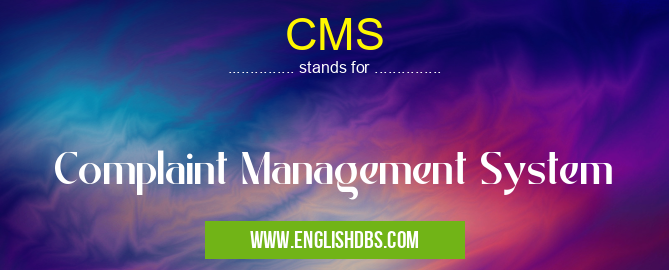What does CMS mean in MANAGEMENT
A Complaint Management System (CMS) is a software or platform that assists organizations in efficiently receiving, tracking, and resolving complaints from customers. It centralizes complaint handling processes, enabling businesses to streamline communication, improve customer experience, and mitigate risks associated with complaints.

CMS meaning in Management in Business
CMS mostly used in an acronym Management in Category Business that means Complaint Management System
Shorthand: CMS,
Full Form: Complaint Management System
For more information of "Complaint Management System", see the section below.
» Business » Management
Key Features of a CMS
- Centralized Platform: CMS provides a central repository for all complaints, ensuring that they are organized and easily accessible.
- Multi-Channel Intake: Customers can submit complaints through various channels, such as email, phone, social media, and website forms.
- Automated Workflow: The system automates the complaint handling workflow, assigning complaints to the appropriate teams and tracking their progress.
- Escalation Management: CMS allows for the escalation of complaints that require higher-level attention or specialized handling.
- Reporting and Analytics: The platform provides robust reporting and analytics capabilities, helping organizations analyze complaint trends and measure performance.
Benefits of Using a CMS
- Improved Customer Experience: CMS enables businesses to respond to complaints promptly and efficiently, enhancing customer satisfaction.
- Increased Efficiency: The automated workflow streamlines complaint handling, reducing time spent on managing and resolving issues.
- Risk Mitigation: By addressing complaints effectively, organizations can mitigate potential legal, reputational, and financial risks.
- Data-Driven Insights: The reporting and analytics capabilities provide valuable insights into customer concerns and help identify areas for improvement.
- Improved Internal Collaboration: CMS facilitates seamless collaboration between different departments and teams involved in complaint handling.
Essential Questions and Answers on Complaint Management System in "BUSINESS»MANAGEMENT"
What is a Complaint Management System (CMS)?
A CMS is a software application that helps organizations manage complaints and customer feedback. It centralizes and streamlines the complaint handling process, enabling organizations to track, prioritize, and resolve complaints efficiently.
What are the benefits of using a CMS?
CMSs offer numerous benefits, including:
- Improved complaint handling efficiency and reduced response times.
- Centralized complaint tracking and management, providing a comprehensive view of customer issues.
- Enhanced visibility and control over the complaint handling process.
- Improved customer satisfaction through timely and effective resolution.
- Identification of common issues and trends for targeted improvement efforts.
What features should I look for in a CMS?
Essential features of a comprehensive CMS include:
- Centralized complaint tracking and management.
- Complaint categorization and prioritization.
- Automated workflows and notifications.
- Integration with other systems (CRM, ticketing, etc.).
- Reporting and analytics capabilities.
- User-friendly interface and mobile accessibility.
How do I implement a CMS?
Implementing a CMS typically involves:
- Defining your complaint handling process and requirements.
- Selecting a CMS vendor and customizing the system to meet your needs.
- Training staff on the new system and processes.
- Integrating the CMS with your existing systems.
- Monitoring and evaluating the performance of the system.
How much does a CMS cost?
The cost of a CMS varies depending on the size and complexity of your organization and the features required. Contact vendors for detailed pricing information.
Final Words: A CMS is an essential tool for any business that values customer experience and wants to effectively manage complaints. By centralizing complaint handling, automating workflows, and providing data-driven insights, CMS empowers organizations to resolve issues efficiently, improve customer satisfaction, and mitigate risks associated with complaints.
CMS also stands for: |
|
| All stands for CMS |
